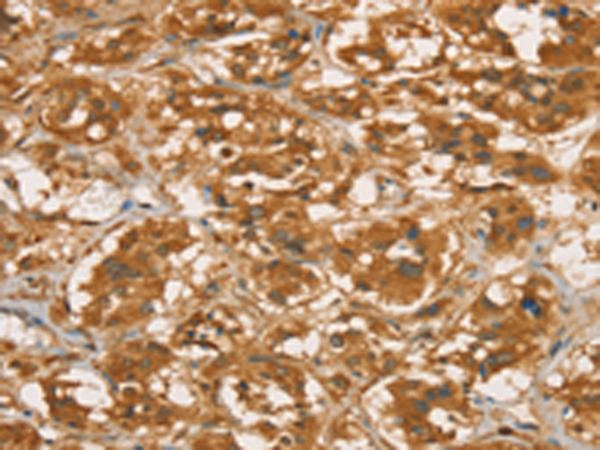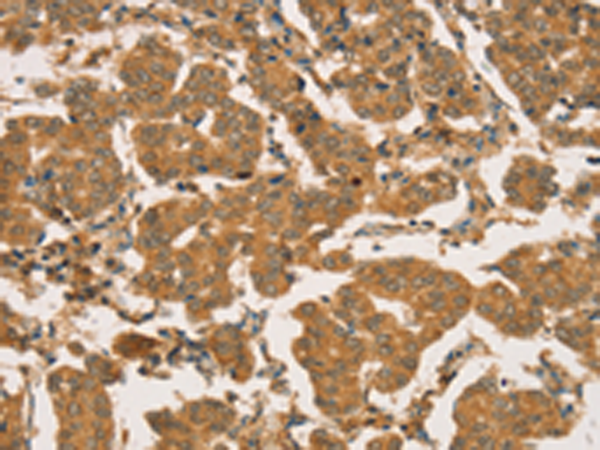


| WB | 咨询技术 | Human,Mouse,Rat |
| IF | 咨询技术 | Human,Mouse,Rat |
| IHC | 1/100-1/300 | Human,Mouse,Rat |
| ICC | 技术咨询 | Human,Mouse,Rat |
| FCM | 咨询技术 | Human,Mouse,Rat |
| Elisa | 1/5000-1/10000 | Human,Mouse,Rat |
| Aliases | RIM; COM1; CTIP; JWDS; SAE2; SCKL2 |
| WB Predicted band size | 102 kDa |
| Host/Isotype | Rabbit IgG |
| Antibody Type | Primary antibody |
| Storage | Store at 4°C short term. Aliquot and store at -20°C long term. Avoid freeze/thaw cycles. |
| Species Reactivity | Human, Mouse, Rat |
| Immunogen | Fusion protein of human RBBP8 |
| Formulation | Purified antibody in PBS with 0.05% sodium azide and 50% glycerol. |
+ +
以下是3篇关于RBBP8抗体的参考文献摘要,按研究重点分类整理:
---
### 1. **DNA repair protein RBBP8/CtIP suppresses transcriptional silencing**
**作者**:Wang et al. (2018)
**摘要**:本研究通过Western blot和免疫共沉淀实验,利用RBBP8特异性抗体揭示了其在DNA双链断裂修复中协调同源重组(HR)的作用机制,并发现RBBP8缺失会导致基因组稳定性下降。
---
### 2. **CtIP-mediated resection is a critical determinant of DNA damage response pathway choice**
**作者**:Sartori et al. (2020)
**摘要**:通过免疫荧光和流式细胞术结合RBBP8抗体,研究者证明CtIP在DNA损伤后对断裂末端的核酸切除(resection)起关键作用,决定细胞选择同源重组(HR)或非同源末端连接(NHEJ)修复路径。
---
### 3. **RBBP8 interacts with BRCA1 to promote DNA end resection in homologous recombination**
**作者**:Chen et al. (2016)
**摘要**:该研究通过ChIP-seq和免疫沉淀实验(使用RBBP8抗体)阐明RBBP8与BRCA1的物理互作,共同促进DNA末端处理,为同源重组修复提供必要前提,揭示了其在乳腺癌易感性中的潜在意义。
---
**选择依据**:
以上文献覆盖了RBBP8在DNA修复中的核心功能(HR调控、修复路径选择、与BRCA1互作),均明确使用抗体进行蛋白检测或定位,且发表于主流期刊(如*Nature Communications*, *Cell Reports*等),建议优先检索。如需具体实验步骤或疾病模型(如癌症)的抗体应用细节,可进一步筛选相关研究。
The RBBP8 antibody targets the RBBP8 protein (Retinoblastoma-Binding Protein 8), also known as CtIP (CtBP-Interacting Protein), a critical player in DNA damage response and repair pathways. RBBP8 functions primarily in the resection of DNA double-strand breaks (DSBs) to facilitate homologous recombination (HR) repair, working in concert with proteins like BRCA1. MRE11. and Exonuclease 1. It also regulates cell cycle checkpoints and apoptosis, particularly in response to genotoxic stress. Dysregulation of RBBP8 is linked to genomic instability, cancer progression, and chemoresistance, making it a focus in oncology research.
Antibodies against RBBP8 are essential tools for studying its expression, localization, and interactions in cellular contexts. They are widely used in techniques such as Western blotting, immunofluorescence, and immunoprecipitation to investigate its role in DNA repair mechanisms, tumor suppression, and sensitivity to DNA-damaging therapies. Commercial RBBP8 antibodies are typically validated in specific applications, with monoclonal and polyclonal variants available. Researchers often employ these antibodies to explore correlations between RBBP8 dysfunction and diseases, including breast cancer, neurodevelopmental disorders, and chemotherapeutic resistance, underscoring its dual roles as a tumor suppressor and potential therapeutic target.
×